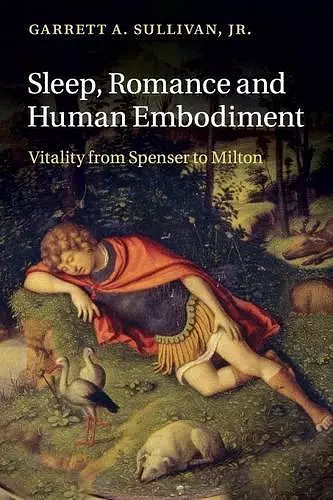Sleep, Romance and Human Embodiment
Vitality from Spenser to Milton
Format:Paperback
Publisher:Cambridge University Press
Published:17th Dec '15
Currently unavailable, and unfortunately no date known when it will be back
This paperback is available in another edition too:
- Hardback£90.00(9781107024410)

Sullivan explores the impact of Aristotelian and Cartesian conceptions of humanness on works by Shakespeare, Spenser, Milton and Sidney.
Contributing to the histories of genre, embodiment and vitality, this study shows the impact of Aristotelian and Cartesian conceptions of humanness on works by Shakespeare, Spenser, Milton and Sidney. Sullivan shows how, through the representation of sleep, epic and romance model the distinctive relationships between man, plant and animal.Garrett Sullivan explores the changing impact of Aristotelian conceptions of vitality and humanness on sixteenth- and seventeenth-century literature before and after the rise of Descartes. Aristotle's tripartite soul is usually considered in relation to concepts of psychology and physiology. However, Sullivan argues that its significance is much greater, constituting a theory of vitality that simultaneously distinguishes man from, and connects him to, other forms of life. He contends that, in works such as Sidney's Old Arcadia, Shakespeare's Henry IV and Henry V, Spenser's Faerie Queene, Milton's Paradise Lost and Dryden's All for Love, the genres of epic and romance, whose operations are informed by Aristotle's theory, provide the raw materials for exploring different models of humanness; and that sleep is the vehicle for such exploration as it blurs distinctions among man, plant and animal.
'This is a major new study with wide ranging implications for a variety of early modern interests - in the contested category of the human, in the ecological place of the human body in relation to its environment, in the legacy of Aristotelianism against the advent of Cartesianism, and in the relations between epic and romance.' Gail Paster, Folger Shakespeare Library
'… a scholarly, intelligent and provocative study that raises many important questions about the relationship between genre and content that are certain to invite further debate.' Richard A. McCabe, Milton Quarterly
ISBN: 9781316505335
Dimensions: 230mm x 150mm x 10mm
Weight: 320g
218 pages